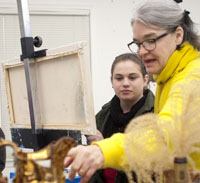Why I Give: Q&A with Karen Patterson '73

Karen Patterson ’73, alumna, Board of Trustees member and donor
After earning her degree at Randolph-Macon Woman’s College (R-MWC) and a successful career managing the environmental aspects of permitting nuclear facilities, Karen Patterson ’73 retired to the mountains. She currently lives on an old farm with fields dedicated to pollinators. She volunteers, whittles down her never-ending reading list, takes continuing education classes, and spends time just being in nature.
Patterson is in her final year as a member of the Randolph College Board of Trustees and has made a planned gift to ensure future students have access to the education and opportunities she was afforded during her time at the College.
Q: What is your fondest memory of Randolph-Macon Woman’s College?
A: This will make me sound extremely antisocial, but my fondest memory of the College was the summer I spent on campus working on the original Blackwater Creek assessment. Two friends and I rented a faculty house on North Princeton.
About 10 or 12 students, from R-MWC, Sweet Briar, and Lynchburg College, basically had the campus to ourselves. It was familiar, yet so unfamiliarly quiet and peaceful. I got to know my professors on a more personal level and discovered the beauty and serenity of the school and the campus, which I had ignored during my academic years.
Q: What is your favorite R-MWC tradition?
A: Well, I am of the generation that eschewed traditions, so no Pumpkin Parade or Daisy Chain, or Odd/Even rivalry. We were the first class that did NOT memorize the alma mater in Latin (truly a blessing).
However, we never gave up singing. Various groups would gather on the stairs or in the halls late at night to serenade everyone. I got weepy then, and I get weepy now whenever I sing those familiar songs.
And, we could rent art from the College’s collection to hang in our rooms for only $1 a year. Although I majored in biology, and that was my life work, my house is full of art, thanks to Mary Frances Williams and that lending tradition.
Q: Why did you choose to support the College with a planned gift?
A: R-MWC was a gift I did not truly appreciate until years later. Part of my appreciation is due to it being a woman’s college, and part due to its small size. I was in a predominantly male profession (and many of those men had commanded nuclear submarines, so not prone to need a woman’s opinion).
The College gave me the confidence to stand toe-to-toe with these men and assert myself. Anyone who is underrepresented in their work has to assert themselves to be heard. Small classes and involved professors still produce graduates equipped to stand up for themselves.
Q: Why do you believe it is important to give to Randolph College?
A: Two reasons. First, I feel better about myself when I am generous with my good fortune. And second, take it from a trustee; tuition does not begin to cover the cost of a college education. I benefited from previous alums’ generosity. Giving to Randolph College is just paying it forward, and it may benefit a student and the world in ways you will never know.
Q: Do you have any advice for new graduates?
A: I can only tell you what I have learned:
The friends I made in college, graduate school, and at my first job are still my best friends. The discipline I majored in looks very different 50 years later. My major gave me a good foundation, but it in no way completed my education.
For a long time, I thought that at some point I would know all I needed to know, and thus be a “grown-up.” Being grown up is no more complicated than recognizing that I will never know all I need to know.
Dynamic learning is much more fun than passive learning. Questioning concepts and ideas rather than accepting them by rote is invigorating and gives me a better understanding of the topic and what I think.
Other than my friends, the most valuable things the College gave me are these: unfettered curiosity; the value of rigorous research and analysis; excellent time management and organizational skills; good oral and written communication; experience in leadership and teamwork, and the confidence that I can do anything I set my mind to.
Want to leave a legacy like Karen’s?
Randolph College needs your help to ensure that future students will be able to enjoy the things that make Randolph unique. Your generous legacy gift will directly impact our students. Please contact The Planned Giving Office at 434-485-8050 or plannedgiving@randolphcollege.edu to learn more.

